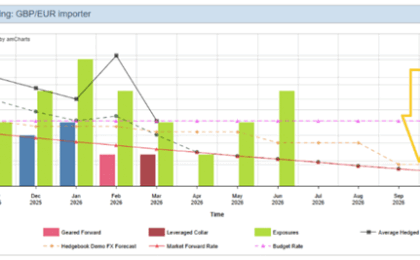Hedge effectiveness testing is a crucial practice in the world of finance, ensuring the changes in fair value of a hedge adequately offset the changes in fair value of the hedged item. In this blog Kevin Mitchell, Managing Director of Hedge Effective Advisory, explores a range of hedge testing methods.
This includes:
- the significance of hedge effectiveness testing,
- the different types of tests,
- the impact of credit risk on hedge accounting,
- and the use of hypothetical derivatives.
By understanding and implementing effective hedge testing methods, businesses can enhance their risk management strategies and comply with accounting standards.
Importance of hedge effectiveness testing
Regularly testing hedge relationships is essential for ensuring the accuracy of financial reporting and qualifying for hedge accounting treatment. By measuring the degree of offset between the fair values of the hedge and the hedged item, companies can assess the effectiveness of their hedges.
Effective hedges help minimize risks and prevent monetary losses over the life of the hedging instrument. Failure to conduct thorough testing can result in errors, potentially leading to the removal of hedge accounting and immediate impacts on the income statement.
Credit risk effects to valuations
Credit risk is a crucial factor to consider in hedge accounting as it can impact the effectiveness of hedging instruments. Changes in credit risk must be reflected in the fair value of the parties involved in the financial derivatives.
“Factors such as credit ratings, netting abilities, collateral posting, trade maturity, and significant books can increase or decrease credit risk.”
IFRS 13 requires the consideration of credit risk when measuring fair value, and adjustments such as Credit Valuation Adjustments (CVA) and Debit Valuation Adjustments (DVA) may be necessary.
Properly accounting for credit risk helps maintain compliance with accounting standards and enhances the accuracy of fair value measurements. Hedgebook has a useful tool for corporates to calculate CVA/DVA within its platform.
Methods for hedge effectiveness testing
Qualitative and quantitative approaches are commonly used to test hedge effectiveness. The qualitative approach is suitable when all key terms match between the hedging instrument and the hedge item. If discrepancies exist, for example, the hedging instrument is off-market, then a quantitative approach involving regression analysis or ratio analysis is necessary.
Regression analysis is helpful when there is basis risk or different underlying risks, while ratio analysis, known as the Dollar-offset test, calculates the percentage offset using fair value amounts.
“It is crucial to review hedge relationships regularly, ensuring that the effectiveness criteria are met and making adjustments if circumstances change.”
Using hypothetical derivatives
Hypothetical derivatives play a significant role in hedge accounting, particularly in cash flow hedge scenarios. A hypothetical derivative is an At-The-Money (ATM) swap with zero fair value at inception, matching the critical terms of the hedged item.
These derivatives require specialized treasury infrastructure for calibration and reporting, which is often unavailable to most finance teams. Establishing the hypothetical ATM rate involves executing trades in the market and confirming the mid-rate at the time of execution.
“Hypothetical derivatives help in measuring hedge ineffectiveness and generating necessary accounting entries.”
Essential hedge effectiveness testing ensures that hedging activities are accurately reflected in financial reporting. By understanding the importance of hedge effectiveness testing, considering credit risk, and using appropriate testing methods such as qualitative and quantitative approaches, businesses can enhance risk management practices.
It also ensures they comply with accounting standards and achieve more reliable fair value measurements in derivative portfolios.
Kevin Mitchell is an accomplished hedge accounting specialist with over two decades of experience as a Chartered Accountant in Australia and the United Kingdom. His passion for helping organisations effectively manage their financial risks led him to found Hedge Effective Advisory, a consultancy that provides expert advice on hedge accounting.




